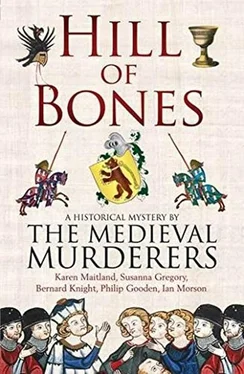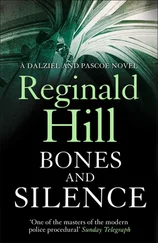‘Revill.’
‘This Mr Revill is right. I have heard that their efforts were well received last night. Remember they are the King’s Men.’
‘And guests in our city,’ added Dr Price.
Maltravers might have said more but he merely humphed again, waddled back to the dining table and returned his attention to the documents. The others soon followed. I wondered why Katherine had wanted to introduce me to them.
She motioned me back into the passageway and said, ‘Did you notice how they stared at you? For a moment they thought you were William Hawkins, returned at long last to the house of his father. I told you that you look like him – a little like, anyway.’
My affairs in this place were done. I did not want any further involvement with the Hawkinses. I certainly had no intention of urging Katherine to come to this evening’s performance, let alone to any renewal of last night’s post-play activities. She was thinking only of her uncle. I would intrude no longer on a house of grief.
There was one more thing to do: to return Uncle Christopher’s commonplace book. If I was accosted again by the burly man from the baths I could genuinely claim not to have it. Even better, to avoid such a disagreeable situation in the first place, I’d make sure I was not out of the protective company of my fellow players for as long as we remained in the city of Bath.
I was about to get the wretched black book out of my doublet when there came a great commotion from the lobby. The sound of women’s voices raised, crying out, interrupting each other. Underneath was a male voice, trying to make itself heard. Was this grief for the dead Christopher? It did not sound like grief.
Then Hannah came running down the passageway and almost collided with Katherine. The young woman put her hands on the shoulders of the older one. She gave the white-faced servant a few moments to recover her breath before asking, ‘What is it? What’s happened?’
‘Oh, it is only William come back,’ panted Hannah. ‘Only William, your cousin and Mr Christopher’s long-lost son!’
I didn’t wait to hear any more. It was as if I was the guilty party in all this. I almost ran through the lobby, past a gaggle of female servants, and a young man who was standing there, looking about him like a stranger. I thought, I played the part of you last night. In passing, I did not note any very strong resemblance between us.
The play we were performing that evening in the yard of the Bear Inn was called A City Pleasure. It was written by Edgar Boscombe, a playwright who may not be familiar to you. He was never very prolific and now he can write no more for he is dead. A City Pleasure is a satirical comedy about a young man from the provinces who comes to London with his sister, looking for pleasure and edification. There are other things in the story but this is the main one. The city of London takes its pleasure with this young couple, duping them and trying to assail their virtue, but throughout the action the two retain a curious integrity and when they return home – sadder, wiser and poorer – they discover that they never were brother and sister. Instead, they are cousins. And so they may marry. Which they do at the end of Act Five under the eye of a kindly, bumbling country parson. This is a play well suited to a provincial audience, for it shows how dreadful and corrupt London is, how honest and honourable are those who dwell outside the capital, and how virtue always triumphs in the end.
A City Pleasure was also a contrast to the blood-letting of the previous night, A House Divided . Contrast and variety make for happy audiences.
I didn’t have such a big part in this satire as in the revenge tragedy, and I confess I spent some of my time off-stage mulling over the strange events of that morning, and the way in which William Hawkins had turned up at the house in Vicarage Lane mere hours after his father’s death. Was this a piece of very unfortunate timing? Or very neat timing? Was it even William Hawkins? Maybe it was another imposter. I had not waited around to see Katherine greet her (presumed) cousin. I would have been uncomfortable in the presence of a man I’d impersonated, even if the act had been done with the best of intentions.
And still I had in my possession the commonplace book belonging to the late Uncle Christopher. At one point I’d flicked through its pages again to see why the burly fellow in the King’s Bath should – under orders, no doubt – have been wanting to take it from me by force. But I saw nothing different from my first examination of it: pages of homemade verses and a few drawings, interspersed with copied-out comments. The subject of Christopher’s poetry, if one could call it that, seemed to be some great battle involving knights of old, the kind of subject that was popular years ago and that has now fallen from favour.
We of the King’s Men finished our second play for the second evening in the Bear Inn yard. A City Pleasure was well received by the Bath audience. They enjoyed our depiction of innocent country cousins who are able to withstand the lures of the big city. As we disrobed in the makeshift tire-room after the performance, there was some suggestive speculation from my friends about my plans for the dregs of the evening. Where was the next letter from my sweetheart? Would I be joining the lady from the town that night? I retaliated by asking whether they’d enjoyed their tour of the Queen’s Bath and the Lepers’ Bath. I was pleased to hear that it had been disappointing.
I had not thought to see Katherine Hawkins again so as I left the Bear, in company with Laurence Savage and Abel Glaze, I was surprised to find her in the inn yard.
‘Nicholas,’ she called softly, nearly cooing my name. The evening was still light since our play tonight had not been as lengthy as the previous one. My heart beat slightly faster to see her standing there, tall and elegant, in the dusk of the inn yard.
‘Oh-ho,’ murmured the others, straining to catch a glimpse of her. ‘Oh-ho.’ I waved them on and went over to join her.
She was not alone. A young man was standing a little behind her. It was William Hawkins, I recognised him before she introduced us. She was not so foolish as to maintain that we’d met before. I might have almost run from their house that morning but now curiosity got the better of me. Why were they here in the inn yard? Shouldn’t they be closeted in mourning for a dead father and uncle? And another equally pressing question: did this young man really look like me?
From some remark he made it was apparent that she’d already described to her cousin how the two of us had become acquainted at the play the previous evening – which was true enough. I don’t suppose she said anything of the further services I did for her, either the one at his dying father’s bedside or the other up in the little gable room.
‘We must talk, Nicholas,’ Katherine said to me. ‘But not here or in the house in Vicarage Lane either. Too many eyes there.’
‘Cousin Kate tells me she trusts you,’ said William Hawkins.
They were a trusting pair of cousins, these Hawkinses. What secrets was I going to find out now?
The three of us went to a nearby tavern called the Raven. The interior was dim and smoky, ripe for a consultation. We found a quiet corner with a table, bench and stool. I sat opposite the cousins.
I took a better look at William Hawkins. He was about my height and build, although his voice did not – to my ears – sound very much like mine. I suppose he would be accounted handsome, which I took as a kind of compliment (to myself, of course). Mr Hawkins did not seem to have changed since his arrival home that morning, for his clothes were creased and travel-stained. I guessed he was normally clean-shaven like me, but now he was stubbly, as if he’d had no time to attend to himself. The only mark of mourning worn by either cousin was a black armband.
Читать дальше












